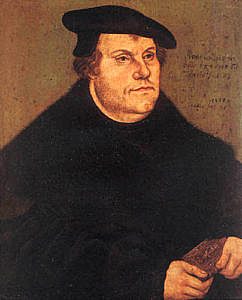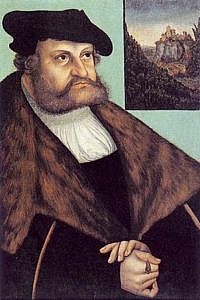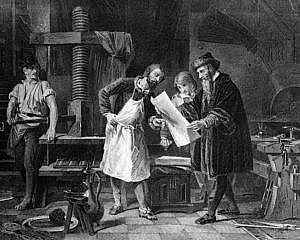On April 19th 1775, British troops marched their way to Concord, MA in search of weapons hidden away by the revolutionaries. Their bright red uniforms caused them to stand out hence some of the colonists called them “Lobster Backs”. As the troops entered Lexington, MA they were met by a group of armed militia later named Minutemen. As tensions rose, someone fired the first shot of the skirmish. Poet Ralph Waldo Emerson would later use the expression “the shot heard round the world” in his famous poem “Concord Hymn”. In hindsight it was understood this was the beginning of the Revolutionary War.
October 31st, 1517 is the day celebrated by Protestants as the beginning of the Reformation, one of or perhaps the most significant event in Church history. It was around this time an obscure priest from Wittenburg, Germany, would challenge conventional Church paradigms and nail his 95 Theses to the door of All Saints Church. Nearly 34 years old, Martin Luder (later changed to Luther) would fire a theological shot which would soon be heard around all of Europe.
NOT ALL IS AS IT HAS BEEN PRESENTED
 For most of those who set out on the ministry trail and have gone through formal training, they are taught Martin Luther is the most significant person in launching the reform movement. Other names like Calvin, Zwingli, Tyndale and Knox are also considered shining lights during the transitional period of the 1500’s. In the hallowed halls of “The Ministry Hall of Fame”, these are the revered busts you would see. The focal point of most discussions about the reform movement are these various ministers and their roles as voices for the movement. What rarely if ever gets mentioned, is the role of those outside the clergy who were instrumental in making sure the reformation movement would see the light of day. God was at work in and through people strategically positioned both geo-politically and in the technology sector to bring about this dramatic shift.
For most of those who set out on the ministry trail and have gone through formal training, they are taught Martin Luther is the most significant person in launching the reform movement. Other names like Calvin, Zwingli, Tyndale and Knox are also considered shining lights during the transitional period of the 1500’s. In the hallowed halls of “The Ministry Hall of Fame”, these are the revered busts you would see. The focal point of most discussions about the reform movement are these various ministers and their roles as voices for the movement. What rarely if ever gets mentioned, is the role of those outside the clergy who were instrumental in making sure the reformation movement would see the light of day. God was at work in and through people strategically positioned both geo-politically and in the technology sector to bring about this dramatic shift.
For those of us in the business world, how many times have we witnessed ground-breaking concepts never making it to market. They are too often DOA due to more powerful leadership forces resistant to change. In 1975, engineer Steve Sasson presented his idea for a digital camera to Kodak executives. We know how that went and where Kodak is today as a result. I have worked with great athletes who were not allowed to showcase their talent due to organizational dysfunction. I have worked through heartache and frustration with actors of great performances which were undermined by terrible film editing or insecure directors. Microbiologist Louis Pasteur was crucified by his medical colleagues when he first presented his theory that disease was spread by germs. Such was the case with Martin Luther. There was a great deal of resistance to his ideas and significant push back from powerful institutional church authorities. Luther had no wealth, lands or armies at his disposal to defend himself. He was not of noble birth and had no social standing. In fact, he was powerless against the forces which would soon rise up against him. These forces had all the components he sorely lacked. When evaluating his initial prospects based on political power, he was a dead man walking. From a business perspective he would have been an extremely high risk investment.
So what happened? How was this priest with no tangible power able to survive and get his message out? One has to look outside the boundaries of the institutional church world to see God’s hand at work in the lives of two key men. Due to the way we’ve been trained to distinguish by religious leaders, we wouldn’t initially recognize them as being vessels of divine strategy. If Pastor, Reverend or Father isn’t in front of one’s name, our tendency is to dismiss them as insignificant to the plan of God. Too often we fall back into our religiously installed default setting that God has an elite full time ministry force he calls upon when he needs to get the job done. They are His exclusive tools. In Luther’s case, God determined two very significant non-ministry men would play a huge role in his life, allowing him to complete the mission in front of him. They were integral to what transpired.
IT COULD HAVE BEEN OVER QUICKLY
Once Luther’s theses were posted events initially moved slowly. Pope Leo X (Giovanni di Lorenzo de’ Medici) would recruit various scholars and theologians to persuade Luther to back down from his position. For three years this went on but in the end it only resulted in Luther becoming more resolute in his ideology. Finally, on May 25th 1521 the Edict of Worms was drafted and Luther was declared a heretic and outlaw. An arrest warrant was issued and it became a crime to give him food or shelter. Anyone who came across him and subsequently killed him would be absolved of any wrong doing. He was a marked man. It is interesting to note Pope Leo X was the last non-priest elected Pope. He was the son of Lorenzo the Magnificent the ruler of Florence, Italy. While Leo was ordained Pope, he was in fact a political appointee.
 The first of the two significant men who enabled Luther to succeed on his mission was Fredrick III the Elector of Saxony. He was also known as Fredrick the Wise. Saxony was the state which surrounded Wittenburg and Fredrick was its ruler. In 1502 it was Frederick who established the University at Wittenburg where Luther would be appointed Professor of Philosophy six years later. Fredrick was quite familiar with Luther’s radical ideas as he would often preach at the small church located in his castle in Wartburg. Fredrick though had few personal interactions with Luther as he was too busy running the affairs of state. The manner in which the two related was primarily through Degenhart Pfaffinger, Fredrick’s treasurer and most trusted confidant. Fredrick and Degenhart had once made a pilgrimage to the Holy Land together and their shared experiences had bonded them into a long term partnership.
The first of the two significant men who enabled Luther to succeed on his mission was Fredrick III the Elector of Saxony. He was also known as Fredrick the Wise. Saxony was the state which surrounded Wittenburg and Fredrick was its ruler. In 1502 it was Frederick who established the University at Wittenburg where Luther would be appointed Professor of Philosophy six years later. Fredrick was quite familiar with Luther’s radical ideas as he would often preach at the small church located in his castle in Wartburg. Fredrick though had few personal interactions with Luther as he was too busy running the affairs of state. The manner in which the two related was primarily through Degenhart Pfaffinger, Fredrick’s treasurer and most trusted confidant. Fredrick and Degenhart had once made a pilgrimage to the Holy Land together and their shared experiences had bonded them into a long term partnership.
Fredrick, using his political clout, negotiated safe passage for Luther in April of 1521 to attend the Diet of Worms and defend himself. A Diet was an imperial assembly of the Holy Roman Empire and Worms the city it took place in. I thought it important to clarify this so one wouldn’t think it was the precursor to the Paleo health diet. Worms were not on the menu. In anticipation of a negative outcome, Martin Luther, Fredrick and Degenhart concocted a plan that upon Luther’s return from Worms he would be “kidnapped”. Masked horsemen disguised as robbers would hijack him. They staged the whole thing and he disappeared off the grid going underground. What had in fact happened was they escorted him back to Wartburg Castle at Eisenach where he found sanctuary from those in hot pursuit and protection from certain death. Later Luther would compare his experience at Wartburg Castle as being “my Patmos” in reference to John who wrote the biblical book of Revelation from his exile on the Greek island of Patmos. Sequestered away and safe from harm, Luther took to writing and expanding on his protest of the church’s practice of selling indulgences. This was a practice which was supposed to get friends and family who had died released earlier from the temporary holding cell of purgatory. He also further developed his thinking on justification by faith and not works, which are the bedrock of Protestant theology. What seldom if ever gets mentioned, is this would never have eventuated without the hand of God moving on the heart of Fredrick the Wise! Luther and his concepts would have been exterminated by the sheer power of the religious leaders who opposed him. He was not powerful enough to stand up to them but Fredrick was. He saved his life and consequently The Reformation!
IN OR OUT; IT’S COMPLICATED
Before we move on to our second key figure and component of the Reformation I’d like to point out a significant dynamic of the unfolding drama. Fredrick the Wise never left the Catholic Church. The reason I bring this up is, based on one’s perspective he’s either being shrewd or a compromiser. For those who view the situation from an ideological perspective, Fredrick compromised by not leaving the Catholic Church and fully embracing the dogmas of the Reformation. For those who view the situation from pragmatic perspective it was a shrewd move as it allowed him to navigate behind the scenes politically. He was able to not only stay informed on potential threats and strategic thinking, but to develop corresponding tactical resistance and counter measures. His clandestine role was instrumental in the success of the Reformation. There is a common paradigm presented by some institutional religious leaders which is to follow God, one has to “come out of the world”. A common euphemism used by these preachers is God wants us out of Egypt and Babylon who represent “the world”. Secular institutions are often viewed as the way of the world. The irony here is some of the most influential people God worked through in the Bible he sent into Egypt and Babylon and trained them there! These are the very individuals he later used to deliver his people from dire situations. In the Hebrew culture deliverers were called messiah’s (Hebrew: mashiach).
TECHNOLOGICAL INNOVATION IS A KEY
As we turn our attention to the second key figure in the reform movement, technological innovation will play a significant role in what develops. Luther had a significant problem; if he wanted to start a revolution while being sequestered away in a castle, how was he going to get his message to the masses? Blogging on the internet was not an option! If he left the safety of the castle he would have been kidnapped or killed. He had limited mobility but the unlimited power of words. He just needed a means and a new technology was at his disposal.
It is hard to rank where people fit in terms of their historical impact, but there are few who would surpass Johannes Gutenberg in significance. Gutenberg was born around 1398 in Mainz, Germany. His innovative technology would be the means by which the ideas of Reformation would spread. For millennials it is hard to grasp a world without the internet. It is the norm and the primary way today we receive information. Without it many people would feel lost. Our cell phones and computers have become the tools we use to access this information. The access to information is the single greatest man-made factor in societal advancement. Imagine… before writing, knowledge could only travel by word of mouth. You had to be face to face with someone in order to share new knowledge. This was where stories and legends were passed down from generation to generation as a means of passing on this knowledge. The storytellers were the revered wise men of ancient cultures. One learned a skill by being apprenticed with an older person who would pass their knowledge down to you one on one. Societal change was slow, happening at around 500 year intervals. In time, writing and later parchment were developed and information could then travel via documents. The limitations you faced were these documents could only be replicated by hand and there were few who could even reproduce them. One typically had to go to a repository where these documents or books were housed in order to access them. In most cases these were churches, monasteries or universities. Public libraries would not come into use until the 1700’s. With books being handwritten they were both rare and expensive. While knowledge was increasing, it was still moving at a very slow pace. It is also important to remember only the political and religious class of the ancient world could read or write; 99% of humanity was illiterate. Keeping people that way was a means of maintaining control.
Through one man, Johannes Gutenberg, God would accelerate the degree of human knowledge doubling from 500 to every 100 years with a single breakthrough! It would come through his invention of a movable type printing press. It seems so rudimentary today but he was the Steve Jobs, Bill Gates or Vincent Cerf (father of the internet) of his day. His impact on the world is hard to quantify but it would not be an exaggeration to say he changed everything. At the beginning, few if any inventor comprehends the full scope of impact their idea will have on the world. The internet was originally the idea of a few government employees looking for a solution to a problem. If the nation was to be bombed and telephone lines cut, how would the military communicate? No one could have foreseen that a military defense solution would one day change not only the way we transact business but our social lives as well.
Very little is known about Gutenberg’s early life and only limited resources are available on his adult life. What we do know is he was the son of a merchant living in Mainz, Germany. He grew up being taught the trade of gold-smithing and engraving. Mainz was an influential center for Christianity in the middle ages. The archbishop of Mainz held one of the most influential positions in the hierarchy of the Catholic Church. There were riots in the area at one point as the city’s craftsmen revolted against the wealthy who they felt were being unfair in what they would pay for work. Gutenberg’s family would relocate to the south in Strasbourg for a few years until things settled down. In 1448, Gutenberg would move back to Mainz and open up a print shop. He needed funding and borrowed 800 guilders from a financier named John Fust. Despite his brilliant invention and its extraordinary impact, he was not a very good businessman. Needing more money in 1452 he agreed to make Fust his business partner but three years later he was still unable to pay him back and a lawsuit ensued.
One of the projects Gutenberg was working on at the time was the reproduction of Bibles. He had printed about 180 copies when the court settlement decreed that Gutenberg had to give Faust half of the bibles and all of the business. Gutenberg’s own son-in-law would testify against his bad management skills which was a devastating blow. The Gutenberg’s didn’t escape the family dysfunctions which have plagued so many of our world changing heroes. He would try and reconstitute a smaller printing shop and do a few more projects but still could not make enough money to be considered successful. The later years of his life he would be looked after with a pension from the Archbishop of Mainz and provided with food and wine. People at that point began to understand the early significance of his contribution. He would die in 1468 having no idea what his invention would do in terms of changing the world. In 1987 one of his surviving Bibles sold for $5.4 million. If one of the other 21 remaining copies should ever be put on the market today, it is estimated it would sell for around $100 million!
Far too often, due to the spiritual paradigms handed down, we miss the hand of God at work in the lives of men and woman whose careers in the various “secular” sectors of life are deemed non-spiritual by some. The contribution of Fredrick the Wise and Johannes Gutenberg allowed Martin Luther to achieve the purpose for which he is known. God used these key people in their respective roles in society to orchestrate a significant outcome.
It’s my hope over the course of our journey together you will look at other familiar stories with a fresh perspective.





I read this, Bob. I find that my call has always been with marketplace men. They live “real” lives, and they want and need other men to intersect with them. Not to criticize, but to walk with them. They are quite willing to expose, over time, who they are. They are just like the rest of us.
Thanks.
Dan Madasz
Thanks for reading the blog Dan! It is my hope that by presenting some different paradigms and shifting perspectives it will open peoples eyes to seeing God at work in the most unexpected places and using the most unlikely people. My blog titled “God Didn’t Get the Memo” addresses this issue.